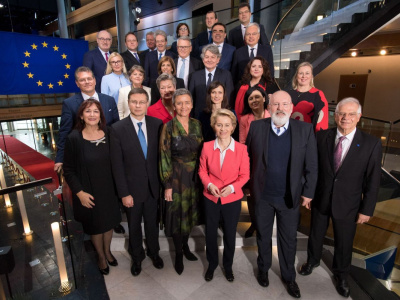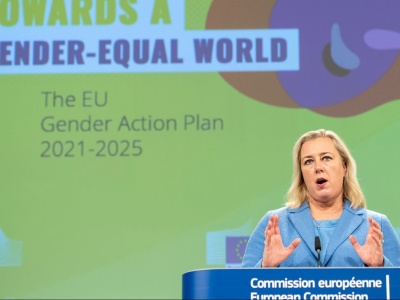
Gender as a top EU priority according to President Juncker and Commissioner Mimica: Now comes the difficult part
This year’s edition of the European Development Days saw several EU representatives, including President Juncker and Commissioner Mimica, reiterating their commitment to making gender a priority for the EU’s external relations and a key driver for achieving sustainable development. A challenging commitment that requires inputs on many fronts. Will European policymakers be able to keep the promises they made last week?
In light of the negotiations of the future EU budget, debates on how gender will be financed and integrated into the next budget are on the rise.
Some of the panellists who took the floor during the EDD considered gender budgeting unnecessary if good budgeting is in place. The general agreement is that budgets do help in empowering women but only if those who administer it are truly sensitive to issues of gender
In various panels, speakers pointed out that gender budgeting should go beyond health services to women and girls, and should also tackle infrastructure, access to finance and credit.
In his speech, Commissioner Mimica assured that the EU will continue to fund initiatives for the protection of sexual and reproductive health rights (SRHR) over the next three years, and through the next EU budget.
In fact, in its development policy, the EU has been active in promoting sexual and reproductive health and rights when funding health projects.
Now the question is whether this commitment will survive the discussions on the next EU budget between progressive member states and those who do not see sexual and reproductive health and rights as a priority in development policy. Recent developments in member states – such as Ireland – might suggest that the context is changing.
More broadly, we are curious to see whether the next EU budget will be overall gender-sensitive. The current proposal does not provide a lot of details on how policymakers plan to encourage gender equality.
Gender, peace and security
Peace and security remain a priority for many European member states. Eighteen have already adopted a National Action Plan on Women, Peace and Security.
The EU is committed to supporting women as positive agents for conflict prevention and sustainable peace, and to make human rights and gender issues an integral part of its external action, as set in the EU Global Strategy.
Yet there is no mention of gender in the first annual report on the implementation of the strategy.
Many stressed the important role of local women when it comes to peace. Women’s valuable insights can contribute to peace negotiations or mediation.
But the space for women’s organisations to do this kind of work is shrinking. So, how serious is the EU going to be about its commitment to “support an open and enabling space for civil society”?
Digitalisation, culture and religion
A number of discussions focused on how to empower women and girls through digital technologies, pointing out the need to build women’s digital skills and promoting their role as users and producers of digital content, as well as to encourage digital entrepreneurship.
This is fully in line with the EU’s intention to integrate digital technology into its development policies. But many are the obstacles standing on the way of more digitally empowered women.
The lack of women leaders (as policymakers, trendsetters, entrepreneurs, artists, and so on) in all sectors, including the cultural one, hinders the promotion of women as role models.
The EU has already highlighted the role of culture as an engine for sustainable development and peace, and as a catalyst for greater equality among genders.
A cultural shift is only possible if different actors, including men and boys, challenge existing social and cultural norms, changing mindsets and empowering women.
In that regard, EDD participants unanimously recognised education as a strong enabler for transforming societies and empowering women and girls.
When it comes to violence against women and girls, international partnerships are crucial. Luckily, we see an increasing number of them taking shape.
This year, the EU and the UN launched the Spotlight initiative to eliminate all forms of violence against women and girls. Together with the Australian government, they have also just signed this year the Pacific Partnership to prevent violence against women and girls in the region. These initiatives are still very young though and have yet to provide concrete results.
The role of religion and whether it supports or hinders gender equality was also discussed. Diverging views were expressed but converged nonetheless on the need to enhance the voice and representation of women and marginalised groups in religious decision-making bodies. Speakers also suggested that the EU should not shy away from engaging in a dialogue on the impact of religion on the rights and daily lives of women and girls.
More than words
After the European Development Days, we are left to take all our good intentions back home together with a major challenge: that of ensuring that these shared and reiterated commitments to gender equality produce meaningful change.
European leaders promised to make gender an integral part of their policy for development and international cooperation. But how and with what resources they intend to do so, still remains very vague. Hopefully, issues of gender will be properly integrated into the political agenda – and the upcoming EU budget – beyond box ticking.
The views are those of the authors and not necessarily those of ECDPM.
In addition to receiving structural support from the ECDPM’s institutional partners, i.e. The Netherlands, Belgium, Estonia, Finland, Ireland, Luxembourg, Sweden, Switzerland, Denmark and Austria, this publication also benefits from funding from the Department for International Development (DFID), United Kingdom.






